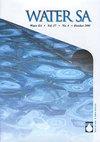持续亏缺灌溉和植物密度对南非中部自由邦油菜水分利用指标的影响
IF 1.2
4区 环境科学与生态学
Q4 WATER RESOURCES
引用次数: 0
摘要
在南非,在西开普省,油菜(Brassica napus L.)在冬季降雨时与小麦轮作种植,主要用于种子制油。建议将这种作物推广到其他8个省份,以减少当地生产的植物油的短缺。同时,在这些夏季多雨的省份,油菜可以作为小麦的轮作作物。在自由邦中部,缺乏关于油菜籽受持续亏缺灌溉和植物密度影响的蒸散量和各种用水指标的资料。试验采用线源喷灌系统,采用4个持续亏缺灌溉水平(每次事件平均灌溉深度减少67%、52%、34%和19%)和5个植物密度(25、50、75、100和125株·m−2)进行全面灌溉作为对照。不同植物密度的季节平均最大蒸散量为429 mm。植物密度对季节蒸散量影响不显著。每次灌溉深度减少20%以上,灌溉深度每增加一个百分比,季节蒸散量平均减少3.5毫米。在充分灌溉和植物密度为75株·m - 2的情况下,生物量水分生产力最高为22 kg·ha·1·mm - 1。在充分灌溉和种植密度为25株·m−2的情况下,种子水分生产力高达11 kg·ha·1·mm−1。灌溉深度若减少百分之一,而种植密度若增加至25株·ha·1·mm−1以上,则种子水分生产力将分别减少0.071及0.033 kg·ha·1·mm−1。持续亏缺灌溉每减少一次灌溉深度,水利用效率平均提高0.5%。本文章由计算机程序翻译,如有差异,请以英文原文为准。
Canola (Brassica napus L.) water use indicators as affected by sustained deficit irrigation and plant density in central Free State, South Africa
In South Africa canola (Brassica napus L.) is cultivated in rotation with wheat under winter rainfall in the Western Cape Province, primarily for seed to make oil. Expansion of the crop to the other 8 provinces is proposed to reduce shortages of locally produced plant oils. At the same time, canola can serve as a rotational crop for wheat in these summer rainfall provinces. In central Free State, information on evapotranspiration and various water use indicators for canola as influenced by sustained deficit irrigation and plant density is lacking. An experiment with a line source sprinkler irrigation system was therefore conducted, comprising of full irrigation as a control with 4 sustained deficit irrigation levels (mean reduction in irrigation depth per event of 67%, 52%, 34% and 19%) and 5 plant densities (25, 50, 75, 100 and 125 plants‧m−2). Mean seasonal maximum evapotranspiration amounted to 429 mm across plant densities. Plant density did not significantly influence seasonal evapotranspiration. Reducing the irrigation depth per event by more than 20% decreased seasonal evapotranspiration by a mean 3.5 mm per percentage increase in irrigation depth. A maximum biomass water productivity of 22 kg‧ha−1‧mm−1 was measured with full irrigation and a plant density of 75 plants‧m−2. Seed water productivity amounted to a high of 11 kg‧ha−1‧mm−1 with full irrigation and a plant density of 25 plants‧m−2. A percentage reduction in irrigation depth and increase in plant density above 25 plants‧m−2 will reduce seed water productivity by 0.071 and 0.033 kg‧ha−1‧mm−1, respectively. Sustained deficit irrigation increased water use efficiency by a mean 0.5% per percentage reduction in irrigation depth per event.
求助全文
通过发布文献求助,成功后即可免费获取论文全文。
去求助
来源期刊

Water SA
环境科学-水资源
CiteScore
2.80
自引率
6.70%
发文量
46
审稿时长
18-36 weeks
期刊介绍:
WaterSA publishes refereed, original work in all branches of water science, technology and engineering. This includes water resources development; the hydrological cycle; surface hydrology; geohydrology and hydrometeorology; limnology; salinisation; treatment and management of municipal and industrial water and wastewater; treatment and disposal of sewage sludge; environmental pollution control; water quality and treatment; aquaculture in terms of its impact on the water resource; agricultural water science; etc.
Water SA is the WRC’s accredited scientific journal which contains original research articles and review articles on all aspects of water science, technology, engineering and policy. Water SA has been in publication since 1975 and includes articles from both local and international authors. The journal is issued quarterly (4 editions per year).
 求助内容:
求助内容: 应助结果提醒方式:
应助结果提醒方式:


